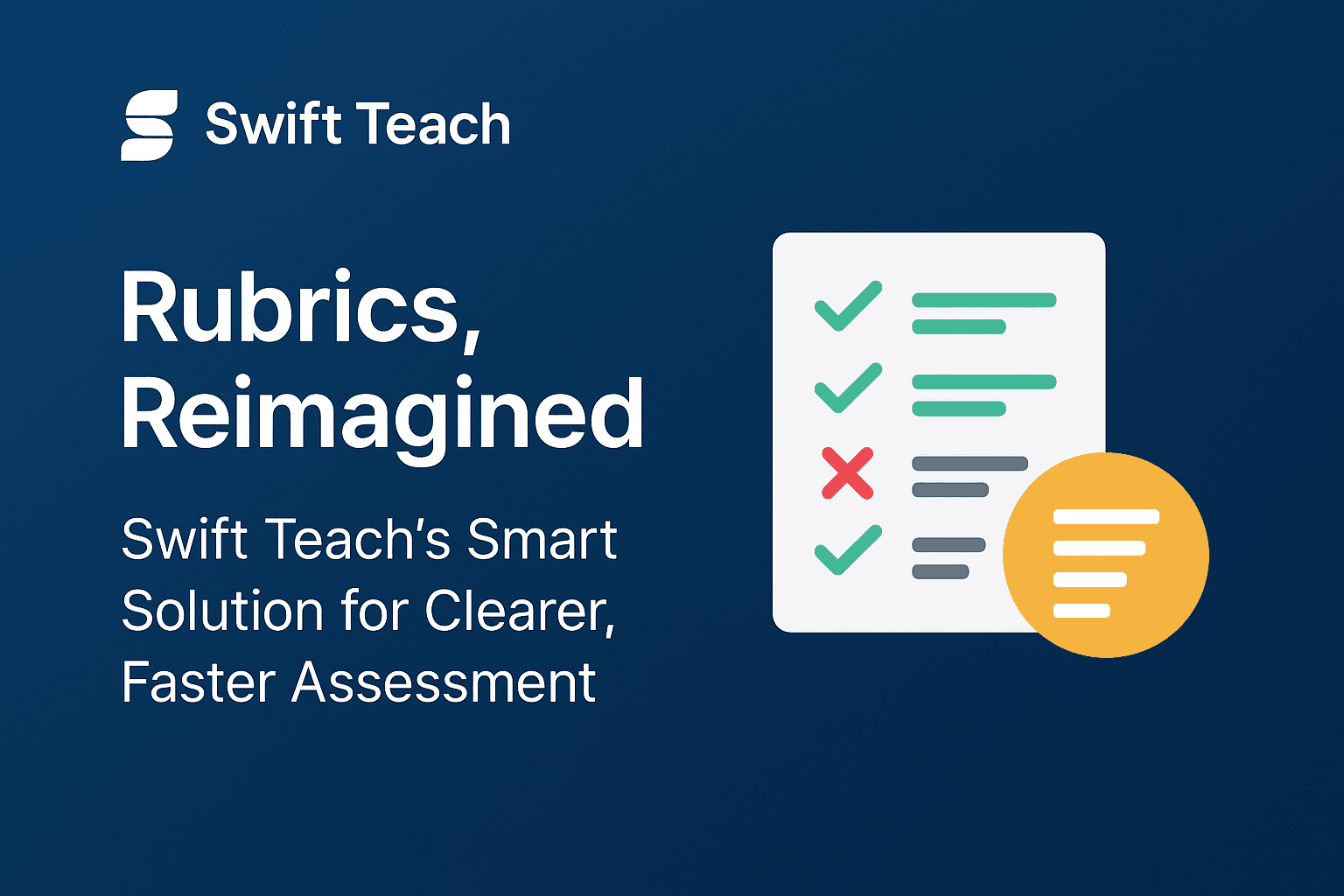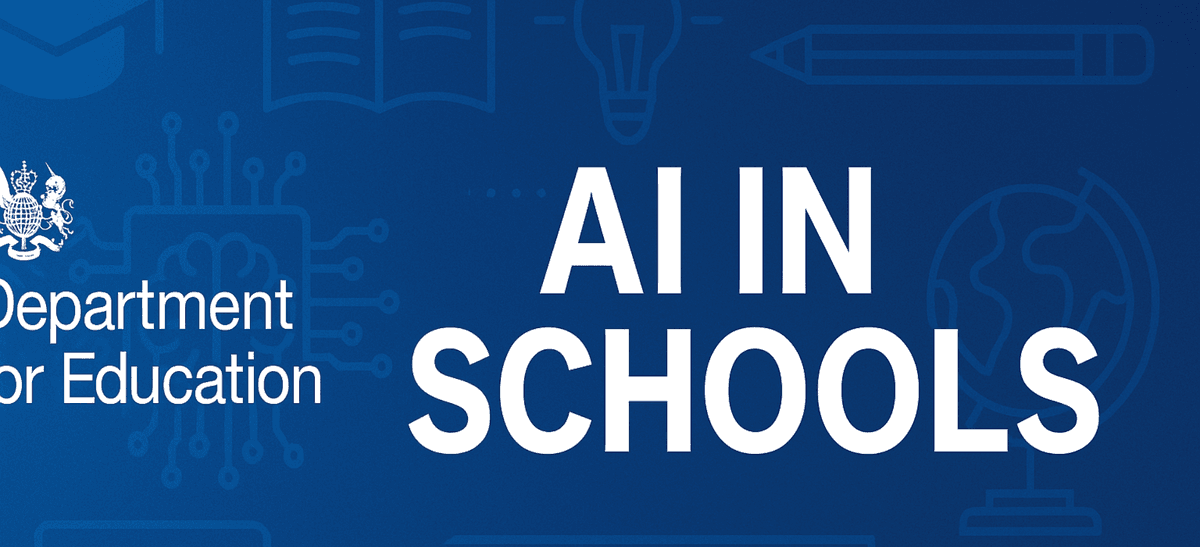
Setting Clear Learning Targets
Creating well-designed rubrics moves the measurement of successful learning from an abstraction to something concrete and observable. A quality Rubric generator for teachers can clarify expectations, guide student practice, and provide an objective and consistent method of grading. When shared with the class, rubrics can help students become evaluators of their own learning.
However, this requires task-specific changes and curriculum alignment. For example, a science teacher’s evaluation of a lab report will be different from that of a literature review or presentation. Each of these activities would be well served by rubrics, but by different kinds of rubrics—and ensuring they align with curriculum standards can be time-consuming.
Swift Teach's Curriculum Connect Feature
Swift Teach’s rubric creation tool includes a powerful Curriculum Connect button that helps you link your assessment criteria to relevant learning standards. This feature guides you in creating purposeful rubrics that align with key curriculum specifications, ensuring your assessments meet educational requirements without hours of manual research.
Swift Teach’s rubric creation tool helps you build assessment frameworks that align with curriculum standards while maintaining the flexibility you need as an educator. Our tool enhances your expertise by providing structure and guidance, while you add the classroom-specific insights that make rubrics effective for your students.
Define Clear, Measurable Criteria
The foundation of any good rubric is clear, measurable criteria that align with your learning objectives. Swift Teach guides you through breaking down both the assignment’s components and the underlying skills you aim to assess. From there, you describe the performance criterion related to those components and skills, ensuring specific guidance for student performance, observable demonstrations, direct connections to learning outcomes, and language accessible to students.
Swift Teach’s Rubric Builder
Using Swift Teach’s intuitive interface, you can quickly generate well-structured assessment criteria. Simply input your subject, grade level, and assignment details, and the tool helps you create focused, meaningful rubric criteria that avoid unnecessary complexity while capturing what matters most for student learning.
Choose the Right Rubric Type
Different types of rubrics serve different purposes, and Swift Teach’s rubric generator for teachers helps you choose the right format for your goals:
- Analytic Rubrics provide detailed feedback by breaking down each component of a task into separate criteria with individual scores. Perfect for complex assignments where you want to assess multiple skills.
- Holistic Rubrics assess the assignment as a whole, giving one overall score based on an impression of the student’s work. Ideal for quick assessments or when focusing on the final product.
- Single-Point Rubrics provide a minimalist assessment tool with expectations at the “proficient” level for each criterion, leaving space for targeted feedback on performance that exceeds or falls short of expectations.
Swift Teach’s rubric creation tool generates these different rubric types quickly and efficiently, with built-in flexibility to customize each rubric for your specific classroom needs and curriculum requirements.
Supporting Student Self-Monitoring
Student-Friendly Language Made Simple
Swift Teach’s rubric tool adjusts language complexity based on your specified grade level, helping you create rubrics that are accessible to all students. The tool provides suggestions for clear, age-appropriate language that students can understand and use to guide their work.
Involve Students in the Process
Engage students in the rubric creation process whenever possible. Whether it’s brainstorming what “excellent work” looks like or reviewing sample rubrics, involving students increases their understanding and buy-in. Swift Teach provides templates that encourage student collaboration in setting standards.
Emphasize Growth and Constructive Feedback
Swift Teach’s rubric creation tool is designed to help you build assessments that focus on growth and constructive feedback. The tool includes prompts and templates that encourage you to highlight strengths and areas for improvement rather than focusing solely on scores, helping you create rubrics that serve both formative and evaluative purposes.
Key Benefit
Swift Teach guides you in creating rubrics that provide clear feedback pathways. The tool helps you structure assessments that give students specific, actionable guidance on their performance while maintaining consistency in your evaluation approach.
Guided Self-Monitoring
Swift Teach rubrics help you create assessments that support student self-monitoring:
- Planning Phase: Students can use rubrics to outline strategies for meeting criteria before starting tasks (e.g., organizing essays around rubric-defined points).
- Task Execution: During performance, rubrics provide reference points for comparing ongoing work against expectations.
- Reflection Stage: After completing tasks, students can use the rubric to evaluate their work, identify strengths, and pinpoint growth areas.
Iteration and Continuous Improvement
Review and Revise with Purpose
Rubrics aren’t one-size-fits-all, and Swift Teach helps you create assessments that can evolve with your curriculum needs. The tool provides templates that allow you to easily modify and improve your rubrics based on student feedback and changing learning objectives, ensuring your assessments remain relevant and effective.
Flexible Templates
Swift Teach provides a foundation that makes it easy to revise and refine your rubrics over time. Use the tool to create multiple versions that you can adapt for different assignments while maintaining consistency in your assessment approach.
Use Rubrics as Teaching Tools
Swift Teach helps you create rubrics that serve as learning guides, helping students understand quality work before they’re assessed. The tool provides frameworks for sharing clear expectations and performance examples, transforming your rubrics into instructional tools that help students self-assess and focus their efforts effectively.
Keep It Simple
Swift Teach helps you avoid overwhelming students with overly complex rubrics. The tool guides you toward the most essential aspects of assignments, helping you create manageable assessments that maintain comprehensive coverage while remaining clear and actionable for both teachers and students.
Test Your Rubric
Swift Teach makes it easy to test and refine your rubrics before implementation. The tool provides guidance for evaluating your assessment criteria against sample work or scenarios, helping you identify unclear language or unrealistic expectations that might need adjustment before you use the rubric with students.
Swift Teach’s rubric generator for teachers represents a powerful resource for purposeful assessment design. When you use this rubric generator for teachers to create thoughtful rubrics, they demystify expectations, promote self-assessment, and show students clear pathways to excellence.
References
Brookhart, S. M. (2018). Appropriate Criteria: Key to Effective Rubrics. Sec. Assessment, Testing and Applied Measurement, 3. https://doi.org/https://doi.org/10.3389/feduc.2018.00022
Veeman, M. J. (2017). Learning to Self Monitor and Self-Regulate. In R. E. Mayer & P. A. Alexander (Eds.), Handbook of Research on Learning and Instruction (2nd ed., pp. 233-253). Routledge.
Create Smarter, Assess Better.
“Swift Teach’s rubric tool saved me hours every week while creating better assessments than I could build manually. The Curriculum Connect feature ensures I never miss key standards again.”
Try Swift Teach Free | See Rubric Tool Demo
Related Blogs

June 28, 2025
AI in Schools , The Biggest Risk Is Doing Nothing...
Generative AI moved from curiosity to classroom staple in under three years. Ofsted’s new study of 2...

June 27, 2025
AI in education...
Why AI in education must evolve Educators embraced Swift Teach for fast, curriculum-linked offering ...
June 5, 2025
Maximizing Lesson Planning: A Deep Dive into Swift...
Artificial Intelligence (AI) is no longer a concept confined to science fiction or tech labs—it’s no...